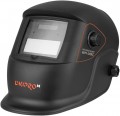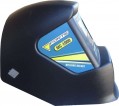Protection from UV/IR
The degree of protection against infrared and ultraviolet radiation provided by the complete mask light filter.
Such protection is relevant primarily when working with electric welding: it is the electric arc that produces a large amount of IR and UV radiation. Exposure to these types of radiation on the skin can cause burns, and ultraviolet light is also harmful to the eyes. The degree of protection in this case is indicated in DIN units, and the larger the number in such a designation, the higher the degree of protection. In this case, 12 DIN is considered the minimum acceptable indicator, however, masks / goggles can be found on the market with higher protection rates — up to 16 DIN inclusive.
From a purely practical point of view, the higher this level of protection, the better; however, this characteristic significantly affects the price, and sometimes also the weight of the mask / goggles. So when choosing, it is worth considering the features of the planned work. For example, it is hardly worth specifically looking for a model for 15 – 16 DIN, if you have to cook rarely and little by little, but for professional use and large volumes of work, this level of protection will be very useful.
Turn-on time
The turn-on time of the filter in the chameleon mask (see "Type"), in other words, the time between striking the arc and darkening the filter to the operating level.
From a safety point of view, the turn-on time should be as short as possible: the faster the "chameleon" works, the less bright light from the arc enters the welder's eyes. On the other hand, reducing the reaction time affects the cost of the product. So for relatively small volumes of work, it is quite acceptable to use relatively “slow” masks — for
100 μs or more(especially since even in the simplest models, the reaction time does not exceed 1200 μs, while theoretically the maximum allowable value is 2000 μs). But for more serious use, you should pay attention to more "fast" options; nowadays, you can find masks with response times
from 75 to 100 µs,
from 50 to 75 µs, and even
less than 50 µs.
Filter viewing area (WxH)
The size of the transparent part of the light filter — the "working window", the area through which the welder sees the place of work. A larger working window provides ease of use and a wide field of view, but it significantly affects the cost of the mask and somewhat reduces the strength of the light filter.
Operating temperature
The range of ambient air temperatures at which the mask is guaranteed to be able to function normally. This parameter is especially important for "chameleons" (see "Functions"), because. the performance of the automatic filter directly depends on external conditions (in particular, at low temperatures, the response time may increase).
Grinding mode
A special mode of operation of the chameleon mask, in which the light filter sensors are completely turned off — thus, it constantly remains transparent and does not respond to any flashes. This mode is useful for jobs that can produce fairly bright flashes of light, but do not require dimming. A classic example of such work is grinding with a “grinder” or a machine tool, when sparks can fly from the workpiece; hence the name of this function —
"grinding" mode.

